Duct fans for exhaust: features of silent models and installation
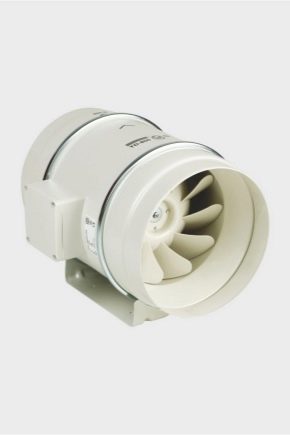
Discharge of exhaust air through windows does not sufficiently solve the problem of ventilation. But even the most carefully designed channel systems often fail to cope with this function. They are helped by specialized ventilation devices that create an enhanced air flow.

Device and principle of operation
The duct fan also has another name - direct-flow installation. Such devices are mounted inside the ventilation duct complex. In order for them to work normally, they are selected in accordance with the geometry and section of the air ducts. It is imperative that each such fan is made in conjunction with an electric motor, they have a common casing. But the basic principle of operation for household exhaust fans may differ: among them there are both axial and centrifugal devices.





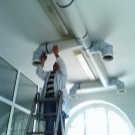
Regardless of this division, the devices contain:
- motor;
- outer case;
- Working wheel.
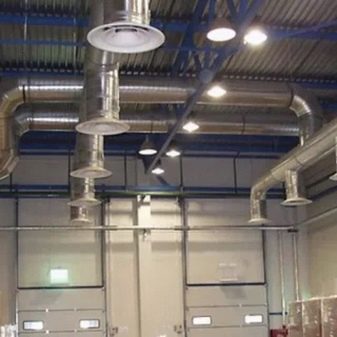

For the manufacture of the case can be used:
- simple steel;
- zinc-coated steel;
- plastic;
- other materials.
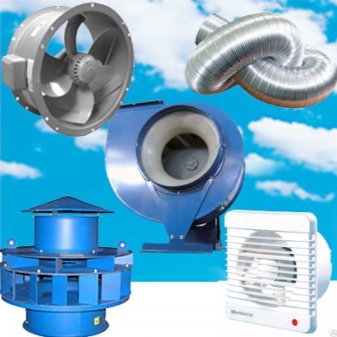
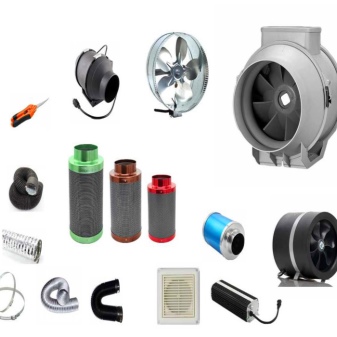
The axial device is a propeller device, more precisely, its adaptation to placement in the channel. Even at the maximum operating mode, such a technique is characterized by low efficiency. It reaches a more or less decent level only in round ducts. To improve the quality of the axle blocks, their creators often mount auxiliary vanes behind the main wheels. This technique allows you to increase the efficiency up to 85%.


The diagonal type fan features a special impeller configuration that can be subjected to powerful static air pressure. This load is generated by centrifugal force. Since the atmospheric flow is directed along the axis, hybridization of the axial and radial schemes actually occurs. Such a technical solution helps to ensure an efficiency of 80%. The diametrical system is built in such a way that the air stream goes around the entire perimeter of the fan wheel.


Cross-flow fans take up quite a bit of space. However, they do not fit well with round ducts. The efficiency level (in the case of an elaborate design) is up to 65%. Such mechanisms are mainly used as an integral part of air curtains. To determine the efficiency of the duct fan, it is necessary to divide the volume of air driven per hour by the total motor power, and then multiply the result by the pressure difference created by the machine.

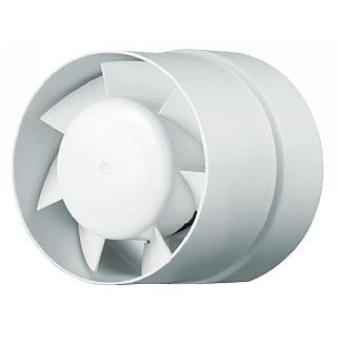
In order to reduce aerodynamic losses, they try to provide a direct path of the air duct from the intake side from 1 diameter or more, and from the discharge side from the fan - from 3 diameters or more. But this technique is not enough to solve all the tasks. The design features and individual nuances of operation for fans from a number of manufacturers may differ significantly. This is due to:
- special use;
- the desire of developers to create a low-noise device;
- the introduction of atypical impellers into the design;
- by varying the device of the guide vanes and other parts.

It is practically impossible to accurately calculate the efficiency and determine the real air losses without special knowledge.Corresponding calculations are carried out based on the results of tests for precisely distributed air flows, and this is true mainly in the industrial field. However, the experience of using channel blocks allows us to confidently say that this is the most effective device format for any situation. They can be used as the basis of a ventilation system in any building.
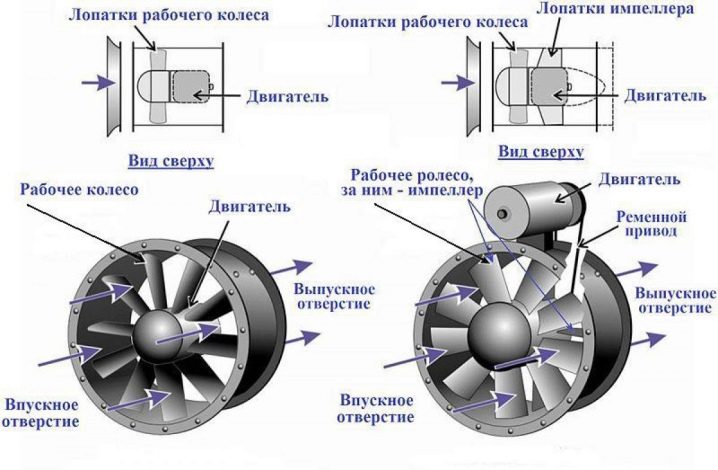
Duct fans can be connected with manual or automatic control. But it does not depend on the decisions of builders and designers, but on a specific model. You can connect the wires so that the movement of air is forced whenever the light comes on in the bathroom, toilet or combined bathroom. However, the use of isolated switches is much more common. As far as the case is concerned, the high quality plastic is better suited for domestic fans - it doesn’t need as strong as in industrial installations.


To make the device quieter, the case is most often created not monolithic, but in the form of a series of layers. The overall performance depends on the arrangement of the impeller. An electric motor is responsible for driving the wheel. The blades, also called blades, rotate as they work, and collision with the air allows it to be pushed in the desired direction. The rotating part of the fan is usually called the impeller, and the blades are mounted on it.

Both silent and loud fans should be equipped with grilles. They perform two important tasks at once: they provide protection from debris and improve the appearance. Thermal protection is also very important, which helps to ensure the stable operation of the device in case of temperature surges. Some of the exhaust fans are also equipped with return valves, which prevent air from being taken through the channel from the street into the room. This danger arises if:
- the device is de-energized;
- the engine is broken;
- the dwelling is colder than outside.


The passive type of check valve closes only by gravity. The practical effectiveness of this method is low and it is used only occasionally. The self-closing part reacts to the stopping of parasitic air flow. Such systems are widely used in kitchens and toilets. There are also valves controlled by electrically powered sensors.


The distribution of the latter option is limited precisely by the dependence on the mains supply. The very operation of the duct fan begins with the creation of a section by the impeller where the pressure is reduced. As it rushes there, the air passes through the grate; but as soon as he touches the blades, the pressure increases. It pushes air through the ducts in the required direction. Thermal contacts break the electrical circuit if heat becomes dangerous to the motor.


Advantages and disadvantages
The undoubted advantage of channel devices is precisely their versatility. You can purchase the same type of device for housing, for industrial premises and for public buildings. The ability to hide equipment behind false ceilings significantly improves the design characteristics of buildings. Installation can be done without the help of professionals, and subsequent maintenance will be reduced to cleaning the blades and housings from dust once every 6 or 12 months. The channel system can work continuously.

It is inconvenient to keep windows in this mode. And plastic and metal-plastic - doubly, because in addition to an unregulated inflow, you can also provoke wear and tear of sealing materials. In this case, the duct fans operate at the same level with certain mode settings. Modern products are equipped with blocks that cut off voltage surges, which radically reduces the risk of destruction of the device.The only problem is that duct fans are not able to purify the air, and if you need to solve this problem, you need to use other equipment.


Types and technical characteristics
An exhaust duct fan can discharge the spent air mass to the outside. The purpose of the supply type of such devices is also clear from their name. And reversible systems are distinguished by the fact that they can arbitrarily change the course of rotation of rotors and impellers. This feature allows you to combine air stripping with the extraction of fresh portions. The circular cross-section of a number of systems makes it possible to mount them on flexible air ducts.


Fans with a square section are not particularly popular. They take up a lot of space and create significant air flow resistance. Axial systems (with a cylindrical body) are favorably distinguished by the lowest noise level. This circumstance is somewhat overshadowed by the reduced power and suitability only for small spaces. Some axial fans are still capable of generating 50dB sound.


Radial fans do not drive the flow along the axis of the electric motor. As the wheel spins, the air entrained in the blades rushes to the edge of the wheel and then is thrown away by the centrifugal effect. Varying the position of the blades determines the course of movement of the air flow. If they are oriented backwards, the overall power of the apparatus is reduced. However, at the same time, noise and current consumption are reduced.
Centrifugal devices have only recently come into mass circulation. The use of special physical effects can guarantee significant power with low noise. In addition, these units have a minimal footprint, making them ideal for small spaces. General purpose duct fans operate in a natural, everyday environment. But there are also devices of special groups, among which it is worth noting mechanisms for smoke removal.
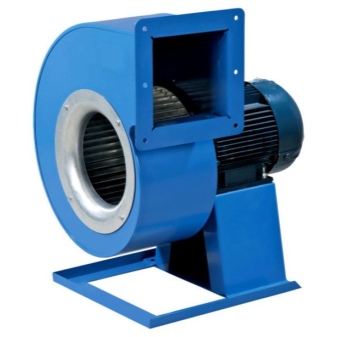

Such systems are capable of operating even in a fire situation (when, in fact, they should be used). The heat-resistant body does not degrade even when heated to 600 degrees and above. The design is also thought out in a special way, allowing to maintain the operability of the main parts. Explosion-proof duct fans are available. Such devices are capable of distilling air containing vapors that are easily flammable or prone to detonation.


The high-temperature unit is widely used in private and public baths, saunas, heated pools. It is also used in hot shops. A special kind of duct fan is mounted where a mass of dust impurities and solid inclusions of various fractions fly in the air. As for the volume during operation, the maximum sound level is 55 dB. But it is recommended to reduce this indicator to 40 or even 30 dB in order to exclude an overload of the hearing organs even with the general sound background.


Those models that are promoted as silent still create a certain sound.however its volume is limited to 25 dB. The design is modified by the addition of spacers and precisely dimensioned bearings. This avoids the slightest vibration of the electric motor. An additional measure of safety is the rational selection of the number of blades and the calculation of their inclination in relation to the holder. This technique ensures that the vibration of the moving air stream is eliminated.
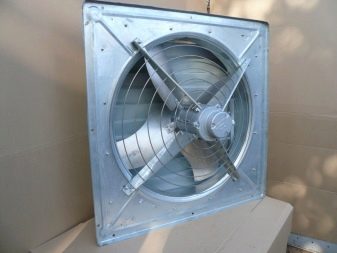

Since even this is not always enough, in some cases the mines are covered with sound-absorbing materials. Silencers are placed near the enclosures of the devices. A reversing device is needed where it is required to provide inflow and outflow with one machine. Non-return fans are valuable in areas with systematic power outages. And it should also be mentioned that in a number of places it is necessary to use devices designed to work in networks with a voltage of 12 volts.


Dimensions (edit)
The dimensions of duct fans may vary. In apartment buildings, it is best to mount those devices, the dimensions of which correspond to the mass varieties of mines and boxes:
- 100 mm;
- 200 mm;
- 125 mm.

Duct devices with a size of 315 mm are characterized by high performance, they can ventilate even large (not to mention medium) rooms. There are options with steel and plastic housings. Thanks to the use of rolling bearings, some manufacturers manage to increase the period of normal operation to 40,000 hours or more. Fans with a cross-section of 160 mm have a fairly significant performance, they can pump from 400 to 560 cubic meters. m of air per hour. In this case, the cost is only slightly increased compared to products of smaller dimensions.

There are upgraded versions of the same size, differing in:
- reduced noise;
- remote control option;
- increased power.

Duct fans with a cross section of 150 mm allow, on average, to pump from 400 to 550 cubic meters per hour. m of air. There are dozens of companies producing blocks of this standard size. Therefore, the selection of suitable systems is not difficult. Excellent performance guaranteed (adjusted for limited pipeline cross-section). The possibility of hiding a small product behind a false ceiling or in a wall significantly increases the aesthetic characteristics of the room.

Fans with a cross section of 250 mm are excellent for ventilating even large areas. Since efficiency is especially important here, most systems are designed to complete round ducts. It is possible to ensure the rational consumption of electricity. The largest units with a diameter of 400 mm can also only be installed in circular ducts by means of a vertical or horizontal connection. It is very important to be equipped with devices that regulate the twisting speed.

Criterias of choice
First of all, you should analyze:
- the intended purpose of the device;
- the required power;
- optimal geometry;
- the area that can be given for the device.

A first approximation of performance can be done with online calculators. But it is much more correct to make an accurate calculation using special software or even contacting professionals. The loudness of the sound of the fans operating in a poorly visited technical room may be disregarded. As for the speed of movement of air flows, it should not be less than 11 and more than 14 m per second in domestic conditions. Also, from the very beginning, it is worth deciding on the presence of check valves, thermal protection, the duration of the device's continuous operation, and so on.

It is recommended that you familiarize yourself with the safety regulations on the IP scale. Moisture resistance is especially valuable in sanitary facilities and kitchens where the air humidity is continuously high. Additionally, you should be interested in resistance to dust particles. The cost of ventilation equipment is determined not only by its power, but also by the presence of auxiliary options. The value of the materials used also plays a role.

The decisive factor in determining the required power is the area to be ventilated. Here you also need to take into account the limiting air flow. Duct fans can even remove bad odors from several rooms at the same time. This is true when doors are constantly open or when installing arches. But then it is required to use devices with a power of at least 40 watts.
High-temperature fans are either centrifugal or axial. In most cases, they do not generate significant noise, but they provide high performance. The resource of such systems is great. For kitchens and heating equipment, including cooking, it is recommended to use models with steel blades. They are much more resistant to the usual effects of fats and soot.

Installation
When installing the ventilation duct, make sure that no more than ¾ of the diameter of the air ducts is up to the wall. The difference between the diameters of the inlet pipeline and the ventilation device should be maximum 8% down and 12% up. It is necessary to check that the absorption of air takes place without any obstacles, that there are no foreign objects in the duct. Compared to the fan, the air duct on the discharge side can be narrowed by a maximum of 15%, and expanded by no more than 7%. If possible, right-angle turns should be avoided and replaced with 45-degree turns.

The easiest way is to install the duct fan into the air duct inlet. Therefore, first they lay an air duct and carefully measure its diameter, and only then select an apparatus for ventilation. For domestic purposes, devices with a diameter of 9-30 cm are used. The optimal place where you can install the fan is the top of the wall near the ceiling itself. Experts recommend performing work during the renovation so that the decorative finish is not disturbed.

The connection diagram for axial fans is as follows:
- attachment by brackets to walls and ceilings;
- connection to air ducts for branch pipes;
- blowing out gaps with sealants or polyurethane foam;
- installation of a decorating lattice on the initial section of the duct.

It is imperative to check whether the unit is firmly pressed against the ventilation ducts. Otherwise, the blowing of the fan against the walls of the air passage will generate noise and lead to breakdowns. The exact sequence of steps can be found in the technical documentation. Safety precautions should not be violated, even if it seems that it will take a long time. Since electrical wires must be protected from mechanical damage, they are covered with plastic boxes or a plaster layer.

If the fan is connected correctly, it should be constantly energized when the unit is in standby mode. This fact must be confirmed by indicators on the cases. Before starting the installation, it is necessary to assess the performance of the ventilation system. You cannot do without fans if a test with a burning match or with a paper sheet shows a negative result. Toilet fans are usually connected directly to switches.

The best point for a toilet duct fan is above the toilet. An axial supply and exhaust fan is installed by removing the protective covers from the device cases. Further, a special adhesive mixture is used. After inserting the device into a specific place, it is pressed as tightly as possible to the surface for 3-5 minutes. After that, return the protective cover to the position reserved for it.

It is very important to check the sealing of all joints. It is there, in the seemingly smallest cracks, that a mass of dirt and grease enters. It is there that fungi and pathogenic bacteria "like" to settle. Installing a fine mesh at the inlet will further reduce the risk of clogging. This will make the fan blades more protected.
For information on how to install duct fans for the hood with your own hands, see the following video.













The comment was sent successfully.